Spaghetti sauce, a cornerstone of Italian cuisine, is a versatile culinary creation that can be tailored to personal preferences. One ingredient that has garnered attention for its transformative effects on spaghetti sauce is vinegar. This analysis delves into the culinary nuances of vinegar, exploring its impact on the flavor profile and overall quality of spaghetti sauce.
Understanding Vinegar’s Role
Vinegar, a product of acetic acid fermentation, introduces a distinct acidity to dishes. When incorporated into spaghetti sauce, vinegar plays a multifaceted role:
-
Balancing Sweetness: Spaghetti sauce often relies on tomatoes as a primary ingredient, which contribute natural sweetness. Vinegar counteracts this sweetness, creating a harmonious balance of flavors.
-
Enhancing Complexity: Vinegar’s acidity adds a layer of complexity to the sauce, preventing it from becoming overly sweet or monotonous. It introduces a subtle tanginess that complements the richness of the tomatoes and other ingredients.
-
Preservation: Vinegar possesses mild preservative properties, extending the shelf life of spaghetti sauce by inhibiting bacterial growth.
Types of Vinegar for Spaghetti Sauce
Various types of vinegar can be used in spaghetti sauce, each imparting its unique flavor characteristics:
-
Red Wine Vinegar: A popular choice for spaghetti sauce, red wine vinegar offers a robust, fruity flavor that complements the earthy notes of tomatoes.
-
White Wine Vinegar: Milder than its red counterpart, white wine vinegar provides a subtle acidity without overpowering the other ingredients.
-
Balsamic Vinegar: Aged balsamic vinegar adds a touch of sweetness and depth to spaghetti sauce, creating a sophisticated flavor profile.
-
Apple Cider Vinegar: With its mild acidity and hints of apple flavor, apple cider vinegar lends a rustic touch to spaghetti sauce.
Incorporating Vinegar into Spaghetti Sauce
To effectively incorporate vinegar into spaghetti sauce, follow these guidelines:
-
Quantity: Start with a small amount of vinegar, typically 1-2 tablespoons, and adjust to taste. Excessive vinegar can overpower the other flavors.
-
Timing: Add vinegar towards the end of the cooking process, allowing it to blend with the other ingredients without evaporating completely.
-
Experimentation: Different vinegars and quantities can be experimented with to find the optimal balance for personal preferences.
Vinegar, when judiciously incorporated into spaghetti sauce, elevates its flavor profile by balancing sweetness, enhancing complexity, and extending its shelf life. By understanding the role of vinegar and experimenting with different types, home cooks can create delectable spaghetti sauces that tantalize taste buds and leave a lasting impression.
A Boost of Flavor
Simmer the sauce gently for approximately one hour. It will reduce and thicken as it cooks.
Also: your house is going to smell amazing!
After cooking, add one or two tablespoons of balsamic vinegar and stir. This gives the sauce a rich depth of flavor and balances it out.
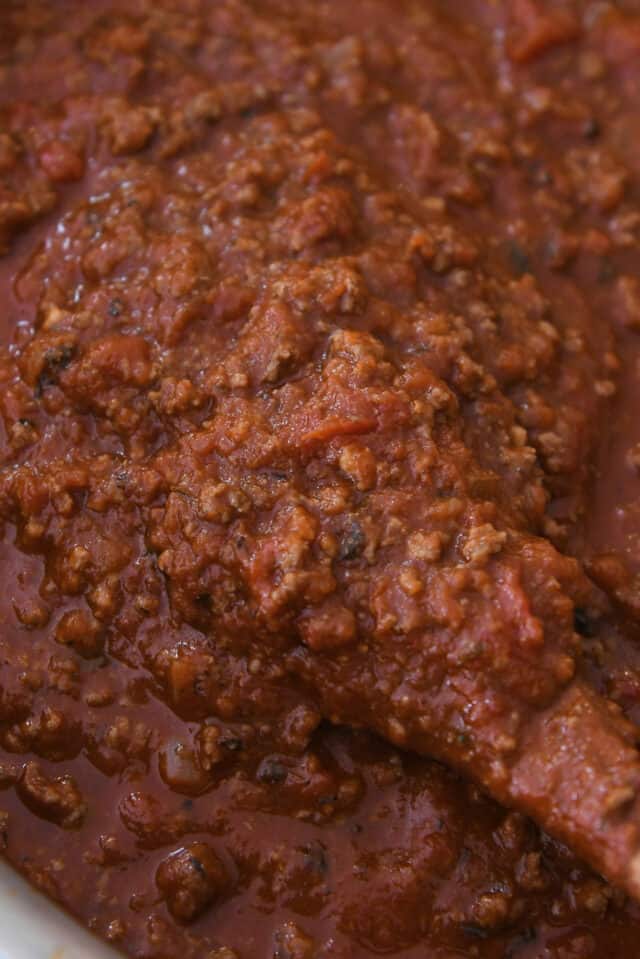
For even simpler preparation, this sauce can be made in a slow cooker with ease!
Instructions for the Slow Cooker: Brown the meat and garlic in a skillet over medium heat. Drain the grease. Then fill the slow cooker with the cooked meat and all the ingredients except the olive oil and balsamic vinegar. Cook on high for 4-6 or low for 7-9 hours. Stir in the balsamic vinegar about 15 minutes before serving.
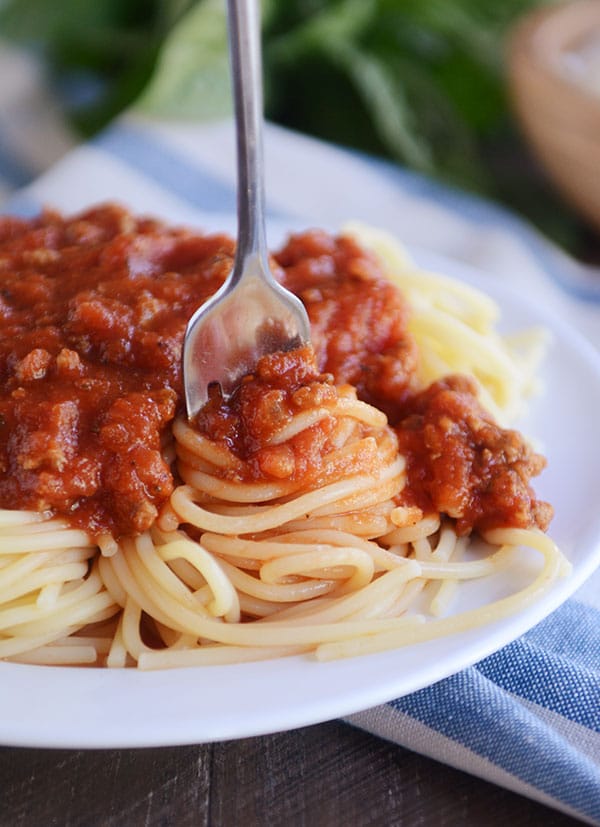
For more than a decade, this has been our go-to homemade spaghetti sauce. It’s perfect for spaghetti. However, it’s also great for many other pasta dishes like manicotti and baked ziti!
So many of you have grown to love this recipe for the rest of your lives.
Elizabeth says: This sauce is so good. I made everything exactly to a T. AMAZING!.
Jorene says: For a few years now, I have been preparing this sauce. It truly is the best recipe. Everybody that eats it loves it. My sister asked for the recipe. That says a lot. I keep it in my freezer all the time.
Christy says, “Wow, this is by far the best sauce I’ve ever made or tasted!” She hasn’t made homemade sauce in over 20 years. Love it and wouldn’t change a thing. Thank you.
How to Make Homemade Spaghetti Sauce
This sauce begins by building levels of flavor.
To begin, place a red pepper and chopped onion in a blender and process until mostly smooth.
This makes the sauce extremely kid-friendly by adding lots of flavor with little texture.
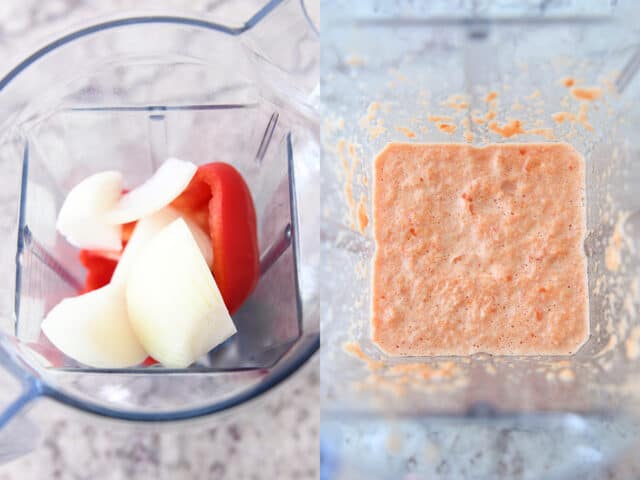
Second, brown a lot of garlic and add the following to ground beef (or a mixture of ground beef, ground pork, or ground sausage).
- tomato paste
- blended onion and red pepper
- dried basil, oregano and thyme
- salt and pepper
Cook that mixture until sizzling and fragrant.
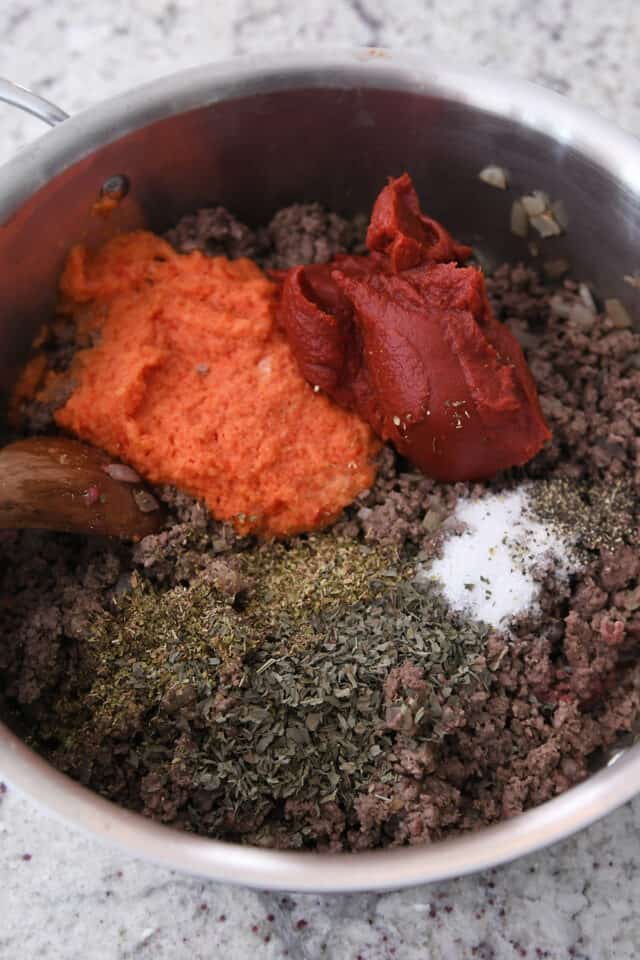
Third: include the “saucy” ingredients along with some additional flavoring ingredients.
- diced tomatoes
- crushed tomatoes
- beef broth or stock
- brown sugar
- bay leaves
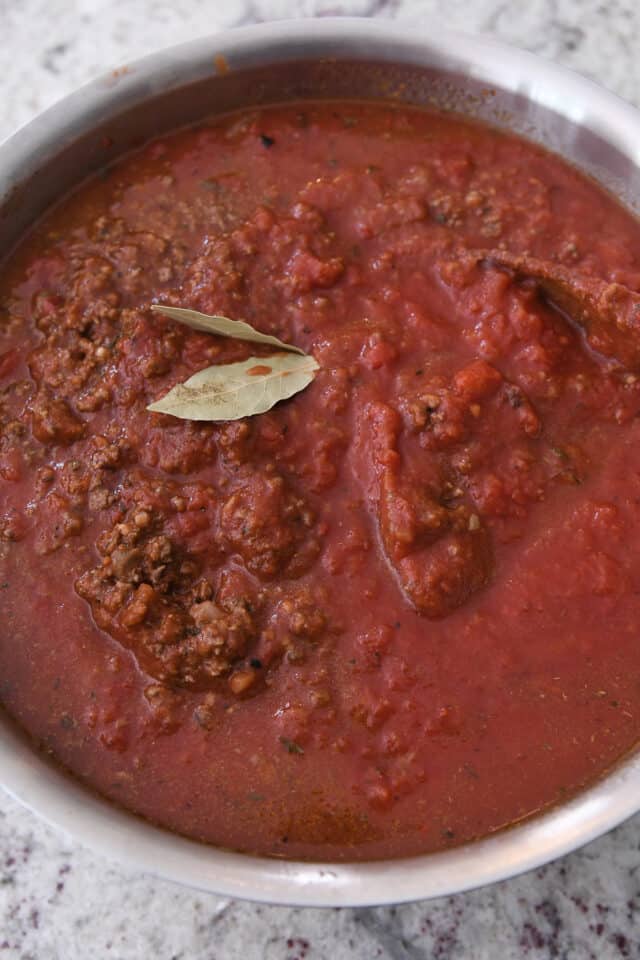
Adding Wine or Vinegar to Spaghetti Sauce
FAQ
What does vinegar do to a sauce?
What is the function of vinegar in tomato sauce?
How do you make a good Spaghetti Sauce?
The flavor in this spaghetti sauce is out of this world delicious. This sauce begins by building levels of flavor. First: throw a chopped onion and red pepper in a blender and process until mostly smooth. Doing this gives the sauce loads of flavor with minimal texture (making it especially kid-friendly!).
What can be used as a substitute for white wine vinegar?
Champagne vinegar is another mild wine-based vinegar. Fermented rice and has a sweet and mild flavor. It is mainly used in Asian cuisine. Apple cider vinegar made from fermented apples, apple cider vinegar. All being a great option.
How do you add starchy water to spaghetti sauce?
Just add a tablespoon, stir, and savor the results. Starchy pasta water is the final ingredient needed to make your spaghetti sauce reach its full potential. While it doesn’t necessarily go directly into your sauce, it makes the perfect binder for the sauce. Basically, adding starchy water to your drained pasta helps the sauce stick to the noodles.
Is baking soda good for spaghetti sauce?
Baking soda is alkaline by nature, so it is exactly what you need to reduce bitterness or too much of a tangy taste. As opposed to other ingredients used to balance acidity in spaghetti sauce, baking soda isn’t sugary, so it’s perfect for anyone who prefers a more savory-tasting finish without any sweetness.
